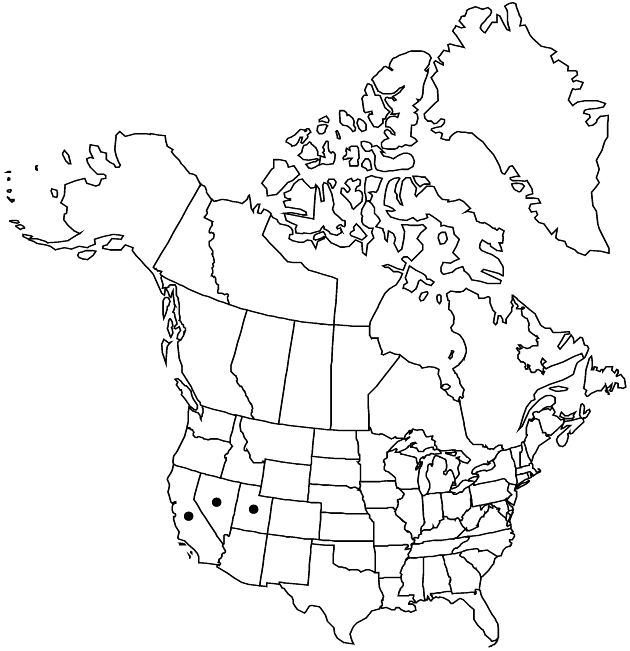Difference between revisions of "Pyrrocoma apargioides"
Erythea 2: 70. 1894.
FNA>Volume Importer |
imported>Volume Importer |
||
| (3 intermediate revisions by 2 users not shown) | |||
| Line 8: | Line 8: | ||
}} | }} | ||
|common_names=Alpine-flames | |common_names=Alpine-flames | ||
| + | |special_status={{Treatment/ID/Special_status | ||
| + | |code=E | ||
| + | |label=Endemic | ||
| + | }} | ||
|basionyms={{Treatment/ID/Basionym | |basionyms={{Treatment/ID/Basionym | ||
|name=Haplopappus apargioides | |name=Haplopappus apargioides | ||
|authority=A. Gray | |authority=A. Gray | ||
| + | |rank=species | ||
|publication_title=Proc. Amer. Acad. Arts | |publication_title=Proc. Amer. Acad. Arts | ||
|publication_place=7: 354. 1868 (as Aplopappus) | |publication_place=7: 354. 1868 (as Aplopappus) | ||
| Line 17: | Line 22: | ||
|name=Pyrrocoma demissa | |name=Pyrrocoma demissa | ||
|authority=Greene | |authority=Greene | ||
| + | |rank=species | ||
}} | }} | ||
|hierarchy=Asteraceae;Asteraceae tribe Astereae;Pyrrocoma;Pyrrocoma apargioides | |hierarchy=Asteraceae;Asteraceae tribe Astereae;Pyrrocoma;Pyrrocoma apargioides | ||
| Line 41: | Line 47: | ||
-->{{#Taxon: | -->{{#Taxon: | ||
name=Pyrrocoma apargioides | name=Pyrrocoma apargioides | ||
| − | |||
|authority=(A. Gray) Greene | |authority=(A. Gray) Greene | ||
|rank=species | |rank=species | ||
| Line 55: | Line 60: | ||
|publication title=Erythea | |publication title=Erythea | ||
|publication year=1894 | |publication year=1894 | ||
| − | |special status= | + | |special status=Endemic |
| − | |source xml=https:// | + | |source xml=https://bitbucket.org/aafc-mbb/fna-data-curation/src/2e0870ddd59836b60bcf96646a41e87ea5a5943a/coarse_grained_fna_xml/V19-20-21/V20_947.xml |
|tribe=Asteraceae tribe Astereae | |tribe=Asteraceae tribe Astereae | ||
|genus=Pyrrocoma | |genus=Pyrrocoma | ||
Latest revision as of 20:06, 5 November 2020
Plants 5–18(–30) cm. Stems 1–7, procumbent to decumbent or ascending, red tinged, scapiform, glabrous or sparsely tomentose. Leaves: basal petiolate, blades lanceolate to narrowly oblanceolate, 30–100 × 2–18 mm (leathery), margins usually coarsely dentate to laciniate, rarely entire, ciliate; cauline sessile, blades linear-lanceolate (bractlike), 10–20 × 1–2 mm; faces glabrous, eglandular. Heads usually borne singly, terminal, rarely 1–2 smaller proximally. Peduncles 2–3 cm. Involucres hemispheric, 7–13 × 13–20 mm. Phyllaries in 3–4 series, green, oblanceolate to narrowly oblong, 4–10 mm, unequal, margins white to purplish, entire, ciliate, apices green, broad, acute, faces glabrous. Ray florets 11–40; corollas 7–16 mm. Disc florets 45–90; corollas 5–7 mm. Cypselae fusiform, slightly flattened, 5–7 mm, 3-angled, faces striate, glabrous; pappi tawny, 5–7.5 mm. 2n = 12.
Phenology: Flowering Jul–Sep.
Habitat: Openings in pine forest, wet meadows, open rocky slopes
Elevation: 2100–3700 m
Distribution

Calif., Nev., Utah.
Discussion
Pyrrocoma apargioides is distinguished by its sharply serrate or laciniate leaves, subscapiform stems with bractlike cauline leaves, and heads usually borne singly. It is thought to be closely related to P. racemosa (H. M. Hall 1928; R. A. Mayes 1976).
Selected References
None.